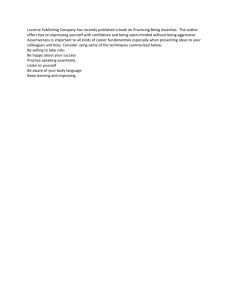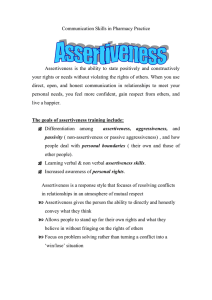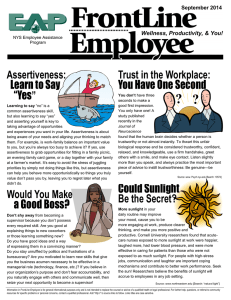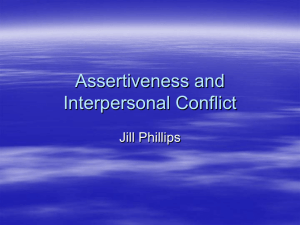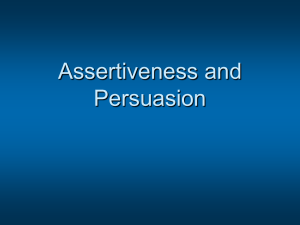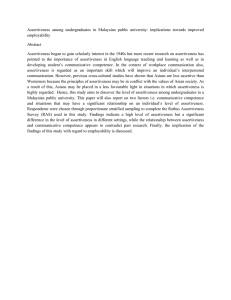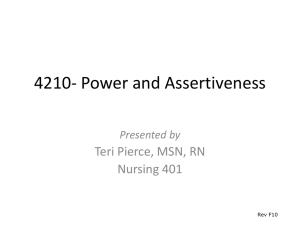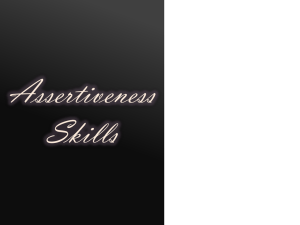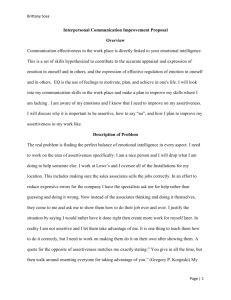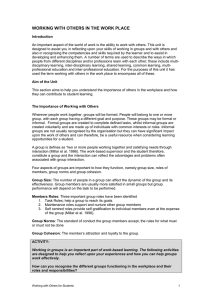Assertiveness - P7 Consulting
advertisement
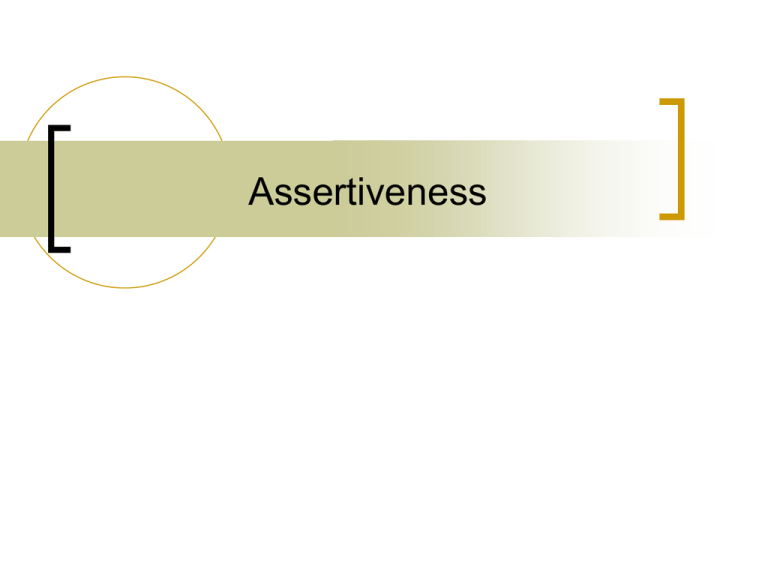
Assertiveness Assertiveness and Styles of Behaviour Assertive •Respecting yourself and others equally •Standing up for what you believe in & not damaging others •Win win situations •Being clear and blame free Passive •Always avoiding conflict •Not asking for what you want •Not saying ‘no’ when you want to •Building up resentment •Not speaking up ito your beliefs Aggressive •Aiming to get your own way at all costs •Showing a lack of respect •Communicating by shouting, swearing and other aggressive speech Indirectly Aggressive •Sarcasm, shaming, put downs •Sulking •Silence v sorting out problem •Looking for people to blame •Not accepting responsibility Why Don’t We Use Assertiveness? The stress barrier Most people feel less able to cope when the stress response is activated To cope with stress: You can deal with the situation itself e.g. by being assertive You can re-evaluate your appraisal e.g. Are you making too much of the situation? B=S+D Deal with the body itself – use a relaxation technique Build stress related resistance (exercise, get enough sleep, less coffee, improve work-life balance etc) 3 Why Don’t We Use Assertiveness? The social barrier Others do not always appreciate assertiveness due to history Don’t blame them control Expect resistance boundaries Expect it to get worse before it gets better gender Check you own barriers (e.g. I was raised to be raised to be nice, you are not as important as a man) 4 Why Don’t We Use Assertiveness? The belief barrier We react not to the ‘actual situation’ but on our interpretation of events e.g. Regarding a pending marriage: “marriage is good for people”, “all relationships in tears”, “she will spend all her time with him now” We develop beliefs: by them being taught to us (e.g. you are stupid) by example of others (e.g. fear of flying) through experience (e.g. three divorces) Becoming aware is the key to dismantling/altering unhelpful behaviour 5 Assertion Skills: Four Part Messages In future...... How do you intend to move forward 6 When ...... What actually happened ACTION PLANNING FACTS ANALYSIS FEELINGS Because .... I felt ...... What is the impact How did it make you feel Assertion Skills: Four Part Messages example Describe the actual offending issue/ behaviour objectively When you are frequently late for meetings.. Describe how it makes you feel primarily I feel frustrated Describe the consequences on your life Because my time is wasted while I wait for you. In future I request that you let us know at least half an hour in advance if you are likely to be late 7 Assertion Skills: A 6 Step Process Preparation: appropriate formulation, ongoing concern, base of trust, likely to get needs met Sending the Assertion Message: go directly to it, be aware of your body language Being Silent: expect defensiveness, enables solutions Reflectively Listening to the Defensive Response: reduces defensiveness, may change our stance, they may speak in extremes Recycling the Process: reassert multiple times, increase the affect (tone, body..) Focusing on the Solution: make sure it meets your needs, paraphrase back, say thanks Handling Defensive Responses Handling hostile responses Accept that it may be work in progress What’s there to lose? Dealing with questions Don’t answer questions when asserting. Reflectively listen instead (e.g. converting it into a statement). Sidestepping debates (apparently objectively) Is a win/lose approach. Don’t engage. Reflect. Coping with tears Empathise but gently and firmly reassert. Overcoming withdrawal Provide silence. “I take your silence to mean…” 9 WHY DON’T WE USE ASSERTIVENESS? The stress barrier Most people feel less able to cope when the stress response is activated To cope with stress: You can deal with the situation itself e.g. by being assertive You can re-evaluate your appraisal e.g. Are you making too much of the situation? B=S+D Deal with the body itself – use a relaxation technique Build stress related resistance (exercise, get enough sleep, less coffee, improve work-life balance etc) 10 WHY DON’T WE USE ASSERTIVENESS? The social barrier Others do not always appreciate assertiveness due to history Don’t blame them control Expect resistance boundaries Expect it to get worse before it gets better gender Check you own barriers (e.g. I was raised to be raised to be nice, you are not as important as a man) 11 WHY DON’T WE USE ASSERTIVENESS? The belief barrier We react not to the ‘actual situation’ but on our interpretation of events e.g. Regarding a pending marriage: “marriage is good for people”, “all relationships in tears”, “she will spend all her time with him now” We develop beliefs: by them being taught to us (e.g. you are stupid) by example of others (e.g. fear of flying) through experience (e.g. three divorces) Becoming aware is the key to dismantling/altering unhelpful behaviour 12
